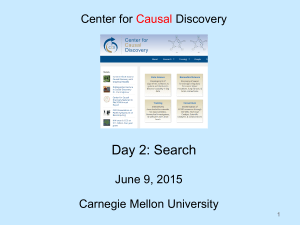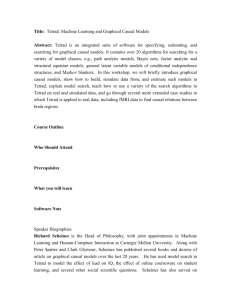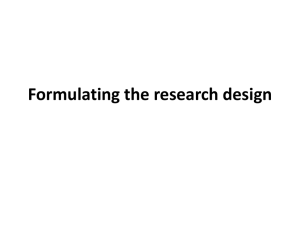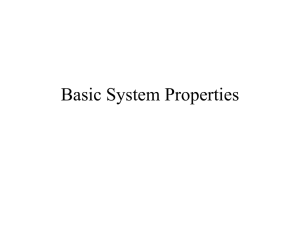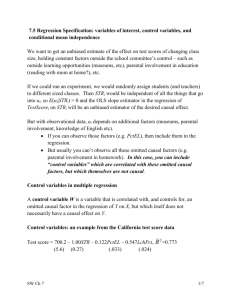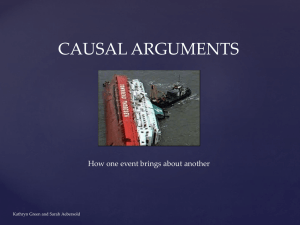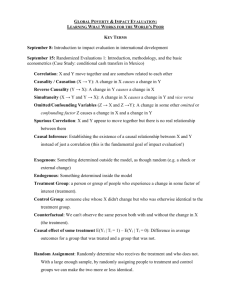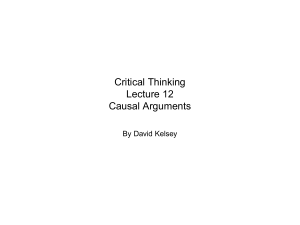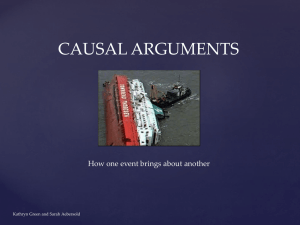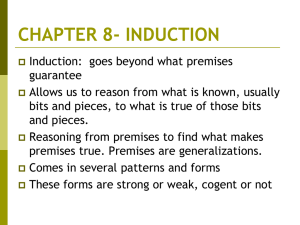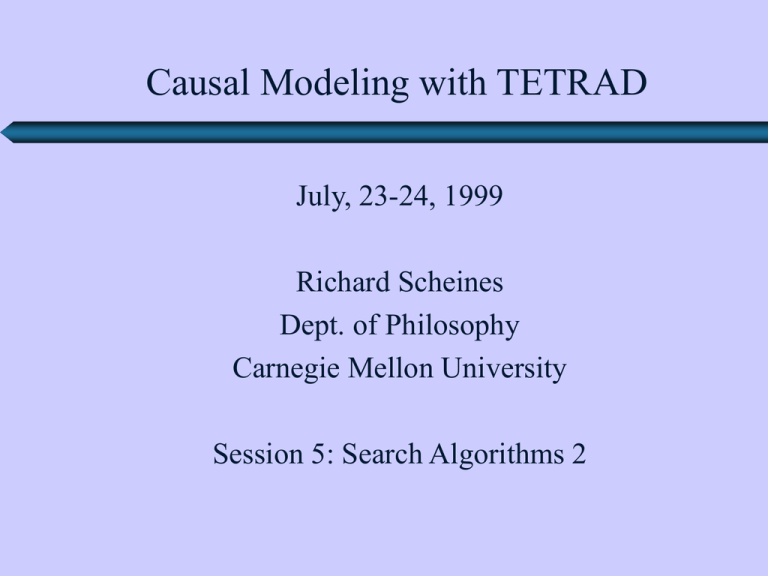
Causal Modeling with TETRAD
July, 23-24, 1999
Richard Scheines
Dept. of Philosophy
Carnegie Mellon University
Session 5: Search Algorithms 2
Search for Patterns
Adjacency:
•X and Y are adjacent if they are dependent
conditional on all subsets that don’t include them
•X and Y are not adjacent if they are independent
conditional on any subset that doesn’t include them
Search
X1
X3
X2
X4
Independencies entailed???
Search
Independencies entailed
X1
X3
X2
X4
X1 _||_ X2
X1_||_ X4 | X3
X2_||_ X4 | X3
Search: Adjacency
Caus al
Graph
Independcies
X1
X2
X1
X4 {X3}
X2
X4 {X3}
X1
X3
X4
X2
X1
Begin with:
X3
X2
X4
Search: Adjacency
Caus al
Graph
Independcies
X1
X2
X1
X4 {X3}
X2
X4 {X3}
X1
X3
X4
X2
X1
Begin with:
X3
X4
X2
From
X1
X1
X3
X2
X2
X4
Causal
G raph
Independcies
X1
X1
X3
X4
X2
X2
X1
X4
{X3}
X2
X4
{X3}
X1
Begin with:
X3
X4
X2
From
X1
X1
X3
X2
X4
X2
From
X1
X4
X1
{X3}
X3
X4
X2
From
X2
X4
X1
{X3}
X3
X2
X4
Search: Orientation
Patterns
Before OrientationY Unshielded
X
X
Y
Z
X
Z|Y
Non-collider
Collider
X
Y
Z|Y
Z
X
Y
Z
X
Y
Z
X
Y
Z
X
Y
Z
Search: Orientation
PAGs
Y Unshielded
X
X
Y
Z
X
Z|Y
Non-collider
Collider
X
Y
Z|Y
Z
X
Y
Z
Search: Orientation
Away from Collider
Test Conditions
X1
X3
*
1) X1 - X2 adjacent, and into X2.
2) X2 - X3 adjacent
3) X1 - X3 not adjacent
X2
Test
X1
X3 | X2
Yes
No
X1
*
X3
X2
X1
*
X3
X2
Search: Orientation
After Orientation
Phase
X1
Pattern
X3
X1
X3
X4
X4
X2
X2
X1 || X2
PAG
X1
X1
X3
X4
X2
X3
X4
X3
X4
X2
X1
X1 || X4 | X3
X2 || X4 | X3
X1
X3
X2
X4
X2
Search Algorithms in TETRAD 3
PC Algorithm
– Input: Independence facts, {time order, required causes,
prohibited causes}
– Assumes no unmeasured common causes (Causal
Sufficiency)
– Output: Pattern
FCI Algorithm
– Input: Independence facts, {time order, required
causes, prohibited causes}
– Does not assume Causal Sufficiency
– Output: PAG
Search Algorithms in TETRAD 3:
The Build Module
User Specified
Independence
Facts
Continuous data
Discrete data
test
2 test
Knowledge: Time order,
Causal Suficeincy, etc.
Independence
Facts
Build
FCI
PAG
PC
Pattern
DEMO Build
X1
X2
True DAG
X3
X4
Build
Create a graph among {X1,X2,X3,X4}
Create a SEM model
Generate data N=2000
Give data to neighbor
Run build twice on data from neighbor
– PC
– FCI
Compare output with neighbor
Applications: Regression to select
Causes
Y = 0 + 1X1 + 2X2 + .....nXn +
Causal Interpretation of regression model:
Edge from Xi Y just in case i 0.
Y = 1X1 + 2X2 + 3X3 + 2= 0
corresponds to:
X1
X2
X3
Y
Applications: Causal Regression
Let the other regressors O = {X1, X2,....,Xi-1, Xi+1,...,Xn}
i = 0 if and only if Xi,Y.O = 0
In a multivariate normal distribuion,
Xi,Y.O = 0 if and only if Xi || Y | O
Applications: Causal Regression
Tetrad
Adjacency
Xi,Y dependent
on every subset
of other regressors
Conditional Independence
Orientation
Collider
etc.,
Conditional Independence
Regression
Adjacency
X ,Y dependent
i the set of all
on
other regressors
Conditional Independence
Orientation
Prefixed
Conditional Independence
Applications: Causal Regression
T1
X1
X2
T2
X3
Y
True Model
X1
X2
Y
PAG
X3
Detecting a Causal Relation
1. From Assuming Z prior to X and Y
2. From Assuming nothing about time order
Detecting a Causal Relation
1. From Assuming Z prior to X and Y
Z1
Equivalence
Class
X
Y
Independence
Relations
I1)
Z1
X
I2)
Y
Z1 | X
1) From time order and I1 - Z1 -- X must be "into X"
2) From Z1--X "into X", and I2, we apply the away from
collider orientation rule, and orient X Y
Detecting a Causal Relation
Equivalence Class
Z1
X
Y
Z2
PAG: Representation of
Equivalence Class
(Common Causal Features)
Z1
X
T
Y
Z2
Z1
X
Y
Z2
Z1
X
Z2
T
Y
Independence
Relations
Z1
Y
Z2
{ Z1 Z2 } | X
The Instruments
Z1
Equivalence
Class
X
Independence
Relations
Y
Z1
Z2
Y
Z1
Instruments
X
Z1
X
Z2
Z1
Z2
X
Z2
Z2
{ Z1 Z2 } | X
The Causal Relation
Equivalence
Class
Z1
X
Independence
Relations
Y
Z1
Z2
Y
X
Z1
X
Y
Y
Z2
Z1
Y|X
Z2
Y|X
Z2
{ Z1 Z2 } | X
Detecting a Causal Relation
1. Find a triple Z1, Z2, X s.t.
Instruments
- Z1_||_ Z2
Z1
- Z1 strongly associated with X
X
Z2
- Z2 strongly associated with X
2. Find a Y s.t.
Z1
- Y strongly associated with X
X
Z2
- Y _||_ {Z1Z2} | X
Y
Parallel to Randomized Trials
X treatment - Y response
We need a Z that is:
1) Into X
Z o X
2) No direct connection to Y except through X
Parallel to Randomized Trials
X treatment - Y response
We need a Z that is:
1) Into X :
Z o X
2) No direct connection to
Z1
X
Y except through X:
3) Z _||_ Y | X - no common cause of X - Y.
Y
?
Sewell and Shaw College Plans
10,318 Wisconsin high school seniors.
sex
iq = Intelligence Quotient
cp = college plans
pe = parental encouragement
ses = socioeconomic status
Variables
[male = 0, female = 1]
[least = 0, ... highest = 3]
[yes = 0, no = 1]
[0 = low, 1 = high]
[0 = lowest, ... 3 = highest]
The Causes of College Plans
Questions:
1) Do sex, IQ, socio-economic status, and parental
encouragement have any influence on college plans?
2) Does SES influence iq?


